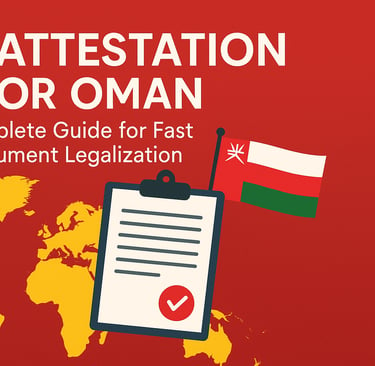MEA Attestation for Oman: Complete Guide for Fast Document Legalization
MEA Attestation for Oman: Complete Guide for Fast Document Legalization
8/13/20255 min read


Understanding MEA Attestation
MEA attestation, a crucial procedure for document legalization, refers to the verification of documents by the Ministry of External Affairs (MEA) of India. This process is particularly significant for individuals intending to reside, study, or work in Oman, as it ensures that the documents they present are recognized and accepted by Omani authorities. The attestation legitimizes various documents, thereby facilitating a smoother transition for expatriates in the country.
The role of the MEA in this context is multifaceted. Firstly, it acts as a validating authority for educational, personal, and commercial documents issued in India. The types of documents that typically require MEA attestation include educational certificates such as degrees and diplomas, commercial documents like business agreements, and personal documents such as marriage certificates or birth certificates. Each document category undergoes a thorough verification process to ascertain its authenticity before receiving the MEA stamp.
The general process of obtaining MEA attestation involves several key steps. Initially, the document must be verified by the respective state authority or the notary public, depending on the nature of the document. Following this, the document is submitted to the MEA for attestation. This procedure entails meticulous checking and validation by the MEA, which can vary in duration based on factors such as the document type and processing workload. Once attested, the documents carry a stamp or seal from the MEA, indicating their legitimacy for use in Oman.
Ultimately, MEA attestation serves as a fundamental step in ensuring that foreign documents hold legal value in Oman. The legalization process not only affirms the authenticity of the documents but also instills confidence in employers, educational institutions, and government entities in Oman regarding the veracity of the documents presented to them.
Documents Required for MEA Attestation
MEA attestation is a crucial step in the legalization process, ensuring that your documents are recognized and accepted in Oman. The list of required documents for this process encompasses various categories, including personal identification documents, educational certificates, and employment-related papers. Each of these documents serves a significant purpose in validating an individual's identity, qualifications, and professional background.
Firstly, personal identification documents are essential for establishing your identity. This typically includes a valid passport, which must not be expired, as well as a recent passport-sized photograph. It is advisable to ensure that the passport information is accurate and the photograph adheres to the specified dimensions required by MEA guidelines. Additionally, if your documents are to be submitted from a different state, consider getting a notarized photocopy of your identification.
Next, educational certificates play a pivotal role in MEA attestation, particularly when seeking employment or further education in Oman. These may include degrees, diplomas, and mark sheets from recognized institutions. Each educational document should be duly attested by the respective education boards or universities and, in many cases, needs to be notarized before submission. It's advisable to verify whether the institution is acknowledged by the relevant authorities in Oman.
Moreover, employment-related papers are crucial, especially for professionals relocating for work. This category generally includes experience letters, appointment letters, and salary slips. These documents prove your work history and qualifications, which are imperative for employment-based visa applications. Similar to educational certificates, these should be attested by the employer and possibly notarized as well.
In terms of deadlines, it is important to plan your document submission in advance, as processing times can vary significantly. Generally, the MEA attestation process may take several days to weeks, so allowing ample time for potential delays can be beneficial in avoiding unforeseen complications during this crucial process.
Step-by-Step Process for Attestation
Obtaining MEA attestation for documents intended for Oman involves a systematic approach, ensuring that each step is meticulously followed to avoid delays. The process begins with the collection of necessary documents, including original certificates, copies, and identification proofs. This stage is crucial as missing documents can hinder progress.
Once the documents are gathered, the first point of contact is a notary. The notary’s job is to validate the authenticity of your documents, which is pivotal before proceeding to the state home department. The home department conducts another level of verification, confirming that the documents are genuine and issued by a recognized authority. It is advisable to check the specific requirements of your state, as protocols may vary.
Following verification by the home department, the attested documents must be submitted to the Ministry of External Affairs (MEA). This step is crucial as the MEA is responsible for the final attestation, enabling your documents to be recognized in Oman. When submitting documents to the MEA, ensure to include all requisite forms, payment receipts, and identification to avoid any complications that may delay the process.
Upon successful submission, you will receive a receipt indicating the tracking details of your application. The processing time may vary, but expecting a duration of approximately 3 to 5 working days is reasonable, depending on the MEA's current workload. To expedite the process, consider using expedited service options where available, and keep track of your application status online.
Finally, once you receive the attested documents, verify that all details are accurate. This last step is essential to ensure that your documentation is ready for use without any potential pitfalls during international dealings.
Frequently Asked Questions and Tips
Individuals seeking MEA attestation for Oman often have various questions regarding the process. One common query is about the duration of the attestation process. Generally, the processing time can vary depending on several factors, including the type of document and the specific requirements of the authority in Oman. On average, document attestation may take anywhere from a few days to several weeks, so it is advisable to plan accordingly and start the process well in advance of any intended travel or legal necessities.
Another frequent concern pertains to the costs involved in MEA attestation. The fees can differ based on the nature of the document being attested as well as the service provider’s charges for expediting the process. It is essential to obtain a detailed cost breakdown ahead of time to avoid unexpected expenses. Be sure to inquire about any additional fees that might arise, such as courier charges or extra charges for emergency processing.
Tracking the status of the attestation can also be a common concern. Many authorized agencies provide tracking services, allowing individuals to monitor the progress of their documents online. It is crucial to keep the receipt or reference number issued during the application process as this will be needed for tracking.
In the event of document rejection, applicants should first understand the specific reasons for the denial. It is often possible to rectify the issues and reapply for attestation. Consulting with the agency that managed your document submission can provide clarity and assistance in addressing any problems encountered.
To ensure a smooth and efficient attestation experience, applicants are advised to double-check all documentation for accuracy and compliance with the requirements set by authorities in Oman. Additionally, seeking assistance from professional service providers can facilitate a hassle-free process. For further information, referencing online resources or government websites dedicated to document verification can also prove beneficial.
Expert
Your trusted partner for document attestation services.
Contact NOw:
Support
+91 9210776391
© 2025. All rights reserved.
